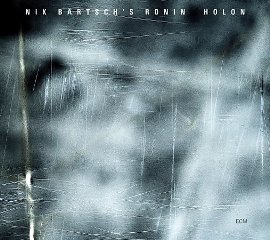Nik Bartsch's Ronin - Holon (2008)
Nik Bartsch's Ronin - Holon (2008)

01. Modul 42 06:28 play
02. Modul 41_17 14:51
03. Modul 39_8 08:00
04. Modul 46 07:16 play
05. Modul 45 09:41
06. Modul 44 09:23
Personnel:
Nik Bartsch: piano;
Sha: bass clarinets, alto saxophone
Bjorn Meyer: bass;
Kaspar Rast: drums
Andi Pupato: percussion.
Swiss pianist Nik Bärtsch writes, rather defensively, that "an ecstatic groove and an ascetic awareness ... are not mutually exclusive". Perhaps he feels the chilly breath of ECM's free-improv giants on the nape of his neck. The music made by his quintet, Ronin, draws on jazz in its harmonic and timbral density, but at its core is an insistent pulse, with a sound somewhere between Steve Reich and EST. The 15-minute Modul 41_17 demonstrates this well, with repeated piano figures that drill deep into your consciousness. Modul 45 has a jerky catchiness that harks back to Monk. There is nothing earth-shatteringly new here - Man Jumping explored this terrain years ago, while the Portico Quartet are the latest to pick up the gauntlet - but Bärtsch and his crew, including Sha on bass clarinet and alto, play this confection with such elan that it's hard not to be seduced. --John L Walters
While Nik Bärtsch's 2006 ECM debut, Stoa, was a powerful first shot across the international bow, garnering a place on many journalists' "Best of" lists for the year, the Swiss pianist had, in fact, been honing his self- proclaimed "Zen Funk" since the beginning of the decade, starting with the equally descriptive Ritual Groove Music (Ronin Rhythm Records, 2001). Holon capitalizes on the success and innovation of Stoa, again featuring his Ronin quintet, proving the value of ongoing musical partnerships, especially when creating music that's paradoxically as rarified and visceral as Bärtsch's. Plenty has been written about the undeniable influence of minimalism on Bärtsch's writing; so, too, the potent grooves that make his music unfold hypnotically; filled with minute detail that captures the attention while being so trance-inducing that it's equally easy to get lost in the music, only to find it come and gone, seemingly in an instant. With returning clarinetist/saxophonist Sha , bassist Björn Meyer, drummer Kaspar Rast and percussionist Andi Pupato—players who, in some cases date right back to Ritual Groove Music and have worked with Bärtsch for at least the past five years—the overall textures remain the same. Still, Holon finds Sha bringing back his alto saxophone, last heard on Aer (Ronin Rhythm Records, 2004), while Bärtsch stays strictly with acoustic piano, though that does nothing to reduce the sonic breadth as he explores not only the full range of the keyboard, but inside the box as well.
Delineated improvisation is still largely avoided, but equally it remains a component of Bärtsch's music, subsumed in much the same way as Norwegian saxophonist Trygve Seim 's work on the outstanding Sangam (ECM, 2005), although that's about the only comparison that can be drawn between these two very different composers, other than their remarkable sophistication at such relatively young ages. Instead, Bäs quintet move, as the leader himself describes, like "a school of fish moving across a coral reef with lightning speed." The rhythmic and contrapuntal complexity of Bärtsch's "Moduls," a uniform, numbered way of titling his compositions that avoids creating any kind of preconception about the music, belies the way in which the music ebbs and flows in a purely natural and uncannily organic fashion.
Repetition may be a fundamental part of the music, but not in the coldly mathematical fashion of some early minimalism. Instead, there's a direct emotional resonance, as the group winds its way through the largely ethereal "Modul 42," where drums and percussion drop out at the three-minute mark for a delicate piano/clarinet/bass trio, and the longer, more potent "Modul 41_17," where Bärtsch meshes new music with existing repertoire from Live (Ronin Rhythm Records, 2003), and places Meyer in an uncharacteristically forward role before the entire band kicks in with its fiery pulse.
With Holon, Bärtsch and Ronin continue to hone an unmistakable music. Cerebral in conception it may be, but this is music that remains almost Jungian in its near-archetypal physicality. -- John Kelman
download (mp3 @320 kbs):
uploaded yandex 4shared mega mediafire solidfiles zalivalka cloudmailru oboom
Zmieniony (Piątek, 08 Kwiecień 2016 16:14)








